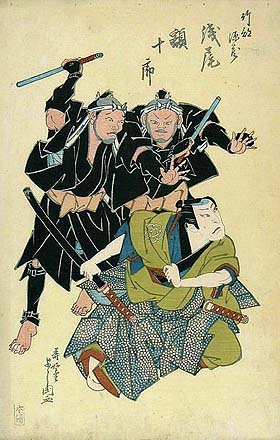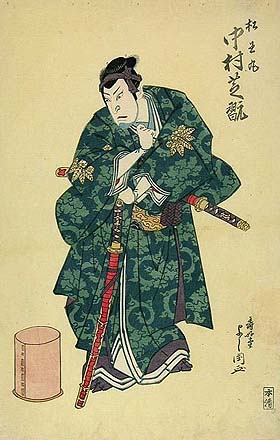| TERAKOYA |
| Play title | Sugawara Denju Tenarai Kagami |
| Authors | Takeda Izumo I Miyoshi Sh˘raku Namiki Senryű I Takeda Koizumo I (Takeda Izumo II) |
| History |
The play "Sugawara Denju Tenarai Kagami" was originally written for the puppet theater (Bunraku) and staged for the first time in the 8th lunar month of 1746 in ďsaka at the Takemotoza. It was adapted for Kabuki the following month and staged for the first time in Ky˘to at the Kitagawa no Shibai, produced by Nakamura Kiyosabur˘ I [casting]. It was also performed for the first time in Edo, at the Ichimuraza, in the 3rd lunar month of 1747 [casting]. This great play is based on the life of Sugawara no Michizane (845~903), a renowned scholar who was promoted up to the prestigious rank of udaijin ("Right Minister", one of the 2 close advisors of the Emperor). Falsely accused by Fujiwara no Shihei, the "Left Minister" (sadaijin), of trying to hatch a plot with Prince Tokiyo to seize the power, Sugawara no Michizane was exiled to Kyűshű. He dedicated his last years in writing poems, expressing both his homesickness and his innocence. After his death, the Emperor's residence was often struck by lightning and people thought it was done by the vengeful spirit of Sugawara no Michizane. A shrine was built in Ky˘to to appease the spirit, the Kitano Tenmangű, and Sugawara no Michizane was revered as a the God of calligraphy. In the play Sugawara no Michizane is called Kan Sh˘j˘. "At the time when the authors were working on the play, a great stir was caused in ďsaka by the birth of triplets. It was therefore decided to make use of triplets in the new production and thus it was that Matsu˘maru, Ume˘maru and Sakuramaru came into being. For the purpose of the story, the triplets are the sons of Sugawara's retainer, Shiratayű. When they were born, Sugawara stood sponsor to all three and named them after the trees he loved best, Matsu (Pine), Ume (Plum) and Sakura (Cherry). On their father's retirement, Ume˘maru took his place as Sugawara's personal retainer. At the same time his two others brothers were found equally worthy employment, one as the retainer of Prince Tokiyo and the other in the household of Sugawara's colleague, Fujiwara no Shihei. When Shihei's jealousy brought about Sugawara's downfall, the triplets became the victims of divided loyalties" (Aubrey and Giovanna Halford in "The Kabuki Handbook"). |
| Structure | The "Terakoya" act, which is nowadays the most frequently performed act of "Sugawara Denju Tenarai Kagami", is the final scene (kiri) of act IV. |
| Key words |
Daigo Tenn˘ Fujiwara Tokihira Gidayű Ky˘gen Giri/Ninj˘ Heian Jidai Jidaimono Kan Sh˘j˘ Kiri Kubi Jikken Migawarimono ďch˘mono ďdaimono ďtoshi Seriu Sugawara Michizane Terakoya |
| Summary |
Kan Sh˘j˘'s only son, Kan Shűsai, has been in Seriu village under the shelter of Genz˘ who was once one of the loyal retainers of Kan Sh˘j˘. Kan Sh˘j˘ has been trapped and banished to a far province in Kyűshű. One day Genz˘ is called before the chief magistrate of the village and ordered to kill Kan Shűsai and bring his head to the authorities. He comes home with a sad look and tries to find a proper child in his school who can be killed in place of Kan Shűsai. Then Genz˘'s wife Tonami appears and reveals that a short time ago a noble woman like a warriors's wife came to ask for permission for her son's enrollment to the school. Kotar˘ is the son's name. Genz˘ makes up his mind to kill him instead of Kan Shűsai thinking he is noble enough to meet Kan Shűsai. He confesses this to his wife. He feels deeply sorry for Kotar˘, but he can't overcome his great obligation to Kan Sh˘j˘. In the meantime Genba comes to the school with his men to ascertain whether Genz˘ did his duty. Genba is a vassal of Shihei, who set the trap and landed Kan Sh˘j˘ in a difficult situation. With Genba is Matsu˘maru. He follows in a palanquin, for he must make it known that he is ill. He has come to make certain that it is Kan Shűsai's head, since he was once a guardsman of Kan Sh˘j˘. The boys of the school are called out one by one, scrutinized by Matsu˘maru and Genba, and released. Genba questions Tonami suspiciously about the number of students. There seems to be one desk too many. Kotar˘'s new desk still stands in the room. Tonami readily admits that it is Kan Shűsai's. Matsu˘maru recognizes it and knows secretly that his son, Kotar˘ is in the school. Genba gives Genz˘ an empty head box, bidding him delay no longer. Genz˘ takes the box up and goes into the inner room. When a sound comes from the inner room, which means his son is killed, Matsu˘maru can be seen to shudder quietly, but he quickly controls himself. Genz˘ returns with the box and sets it before Matsu˘maru for inspection. Genz˘ kneels down and watches the inspector intently with his hand on his sword hilt. If Matsu˘maru sems to deny that the head is Kan Shűsai's, Genz˘ intends to cut him down instantly. Genba's guards close in on Genz˘ with their weapons drawn, ready to kill him if he has attempted a fraud. Matsu˘maru himself is not certain what he will find in the box. He slowly lifts the cover off the box. When Kotar˘'s head is revealed, he gazes upon it and says in a firm voice:"This is indeed the head of Kan Shűsai. There is no mistake". After this, Genba and his men leave along with Matsu˘maru. Genz˘ and his wife then call Kan Shűsai from his hidding place and weep with relief that he is alive. In the meantime, Matsu˘maru's wife and Kotar˘'s mother Chiyo is seen approaching the gate. She calls "my dear son Kotar˘, Kotar˘, Kotar˘!". Genz˘, in desperation, tries to kill her. Chiyo barely escapes the sword blows and shows him a shroud of a little boy and flag which reads "Lord have mercy upon me". Genz˘ stands back and is dumbfounded. He asks "whose child was this?". Matsu˘maru appears saying "My son! my son, Kotar˘ died gloriously and usefully". He explains the details of the matter. Even after becoming a follower of Shihei, Matsu˘maru has wanted to repay his ex-master Kan Sh˘j˘'s kindness to him. Finally on this day he happened to know Genz˘'s predicament and was able to persuade his wife to sacrifice their son for Kan Shűsai. When he asks Genz˘ whether Kotar˘ dies worthily, Genz˘ answers "Honorably ... When I told him he must die, he smiled". Matsu˘maru and his wife weep in sadness and joy to hear that (˘toshi). Matsu˘maru takes heart and summons his palaquin. From it steps Sonoo-no-Mae, Kan Sh˘j˘'s wife and Kan Shűsai's mother. Kan Shűsai comes in. Mother and Son comfort each other. They light a sacred fire to honor Kotar˘'s soul. This summary has been written by Watanabe Hisao, edited by Jeff Blair and Sh˘riya Aragor˘ [website] |
 |
 |
| The actors Asao Gakujűr˘ and Nakamura Shikan II playing the roles of Takebe Genz˘ and Matsu˘maru in the "Terakoya" scene of the drama "Sugawara Denju Tenarai Kagami", which was produced by Asao Yosabur˘ in ďsaka in the 3rd lunar month of 1826 at the Naka no Shibai (print made by Juk˘d˘ Yoshikuni) | |
| Prints & Illustrations | |
|
|
| Contact | Main | Top | Updates | Actors | Plays | Playwrights | Programs | Links | FAQ | Glossary | Chronology | Illustrations | Prints | Characters | Derivatives | Theaters | Coming soon | News |